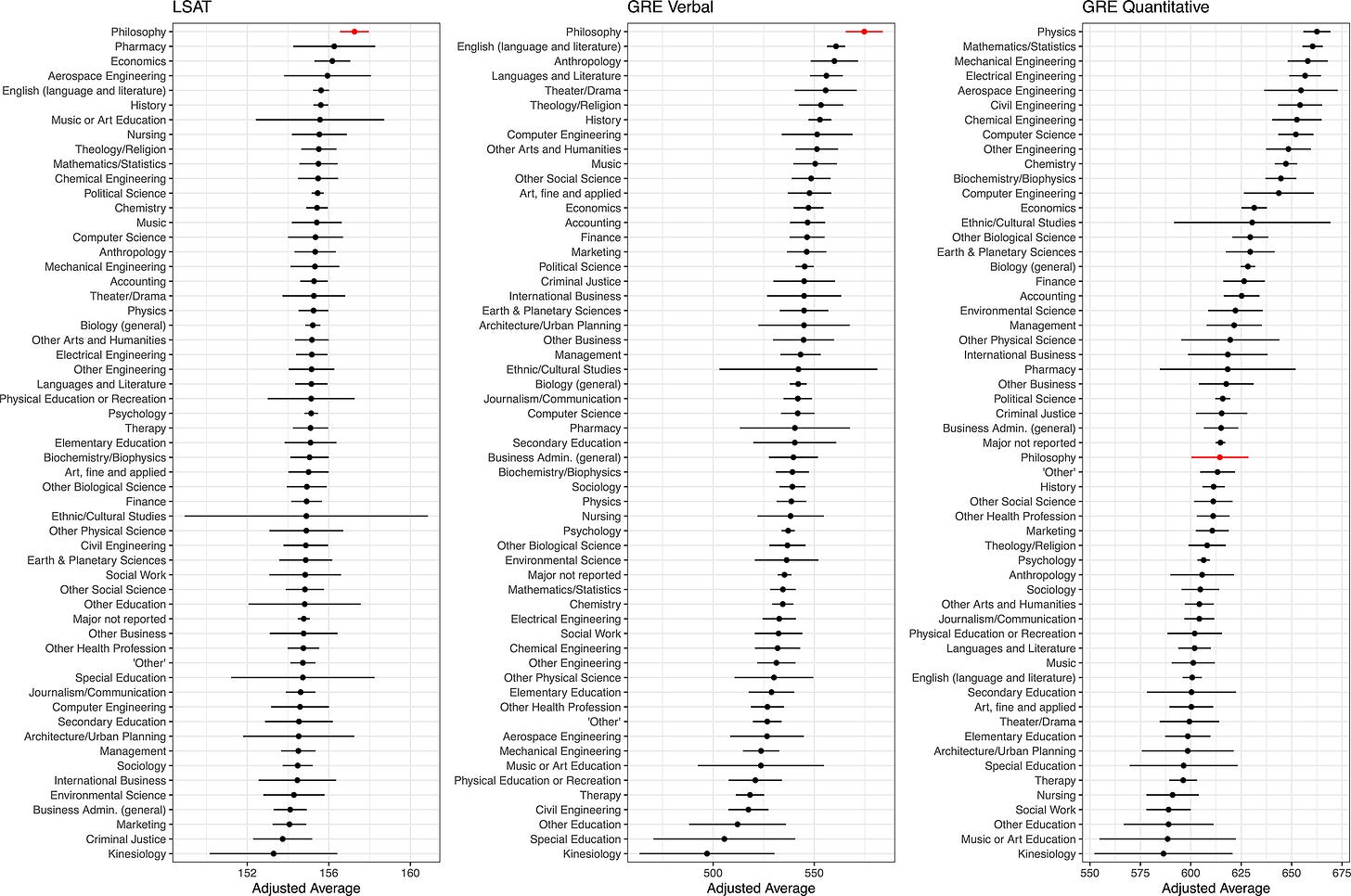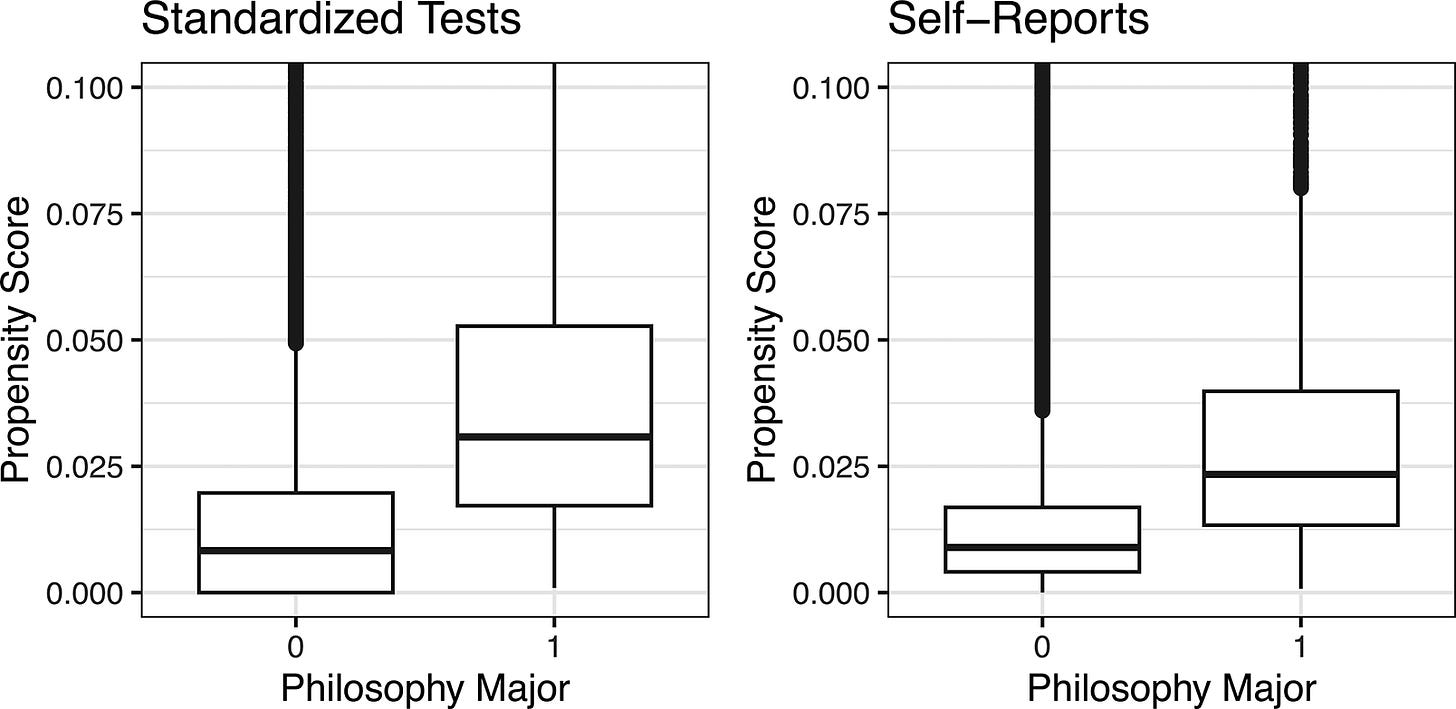Why I should start telling my finance and econ students to switch majors
And how studying philosophy has a positive effect on intelligence
Why I may need to start telling my finance and econ students to switch majors—or at least borrow more habits from philosophy
How new research suggests that studying philosophy actually grows your intelligence, not just flatters your ego
How being surrounded by philosophers may sharpen your reasoning more than any spreadsheet grind or late-night case study
Why philosophy’s open-ended questions train the brain in ways finance problem sets never will
How the company you keep is the hidden driver of your intellectual growth (yes, chess club counts)
Whenever a study claims that a particular habit, behavior, or contextual cue leads to higher cognitive performance, my ears perk up.
Over the years, I’ve been keeping a quiet tally of what makes our minds sharper versus what makes them duller. Those who have followed the same know that it’s an uneven ledger. There are endless ways to blunt our cognition, and far fewer proven ways to enhance it.
This is why I share every finding of the latter kind liberally in the classroom and beyond, hoping that the precious few good habits stick.
Now, a recent study by Prinzing and Vázquez has me in a bit of a bind.
They show that studying philosophy has a robust, measurable effect on raising verbal and logical reasoning outcomes. And here I am, teaching in business schools, trying to convince finance, management and econ students that they’re sharpening their intellects in the best way possible.
The study is open access and it’s worth reading just to see where your chosen major lands in terms of its impact on verbal and quantitative abilities. You might even find the below chart helpful in finding new ways of poking fun at your friends and their major-minor combo, some of which seem to land people worse off than what they started with.

How the study worked
Prinzing and Vázquez used HERI (the Higher Education Research Institute database), which tracks student surveys and outcomes across U.S. colleges. They looked at 600,000 students’ baseline abilities when they entered university and then compared them to post-graduation performance, focusing on GRE and LSAT scores.
In other words, they weren’t cherry-picking star philosophers to show that smart people tend to stay smart, although I know a few campuses and Greek houses that might make you question that assumption. Instead, they controlled for incoming skills and measured how much students grew during their studies.
In their dataset that spans 1990 to 2019, philosophy majors showed the steepest gains in verbal and logical reasoning, even when accounting for where they started. In other words, the discipline doesn’t just attract wordy, argumentative types, which it clearly does, but actually seems to make people sharper who take on the discipline.
My own triad of law, econ, and history fared reasonably well, though it pales in comparison to the gains a major/minor combo of philosophy and physics deliver. And if I were advising someone on kinesiology after looking at these results, I’d have to pause and think deeply about how to break the news.

What’s driving the results
The researchers are careful to note that self-selection plays a big role, and rightfully so. People don’t just pick majors at random. We gravitate toward fields that fit our personality, skills, and self-perceptions. There’s plenty of literature showing this (for example, Holland’s theory of vocational choice), and ignoring it would be naive.
The fact that even when controlling for incoming ability, philosophy majors pulled ahead suggests there’s something baked into the discipline itself that sharpens the mind.
I think two things are happening here, the first entirely underappreciated, the other almost too obvious to count as profound.
The first driver that I identify here is simply the company we keep.
Decades of research have shown how peers shape us far more than genes or even parents, from the languages we acquire (creolization studies are a great example) to the habits we adopt (think of social contagion research on obesity, smoking, even happiness).
Being surrounded by philosophers makes one think more like a philosopher, especially when one is young, malleable, and trying on identities like a pair of new ON sneakers.
This is a reminder that the circles we move in can literally make us smarter, as long as we choose our friends carefully. For anyone who’s ever mocked the chess or Dungeons and Dragons club and opted for something more beer-pongy, it might be time to reconsider your life choices.
The second driver is simpler to the point we dismiss it, but it is no less powerful. We inevitably get better at what we practice.
Philosophy is to the mind what kinesiology is to the body: training. Engaging in intellectually rigorous, open-ended questions that don’t have tidy answers forces the brain to stretch in ways that other disciplines rarely demand.
And yet, we often miss this as we make choices about where and how we spend our time.
Just because a task feels mentally exhausting doesn’t mean it’s building cognitive muscle, otherwise me and my econ PhD colleagues would be on the top of the list.
Filling out a spreadsheet late into the night may leave us drained, but it doesn’t necessarily leave us sharper. By contrast, wrestling with questions that resist easy closure, whether in metaphysics, ethics, or logic, develops reasoning capacity in ways that show up on standardized tests and, more importantly, in everyday life.
What this means for my students
For the 200+ students joining me this fall at Harvard, Columbia, and Stern, some of whom are already subscribed here, consider this fair warning: you’ll hear me speak more kindly of our philosopher friends. Perhaps even with a tinge of envy.
You can also expect more assignments that push you into open-ended, nuanced thinking. Not because I enjoy the squirming, but because I want to see if we can replicate the gains Prinzing and Vázquez describe.
If studying philosophy sharpens the mind this reliably, maybe I should start telling my finance and econ students to switch majors. Or, at the very least, to spend more time in the company of those who do.
A book to read
A modern classic that takes great philosophers, Socrates, Seneca, Schopenhauer, and others, and shows how their thinking applies to everyday life. More than a crash course, it’s a reminder that philosophy is less about ivory towers and more about navigating the messiness of being human.
A thing to do
Channel your inner Socrates
Instead of rushing to answers, start asking layered questions: What do I mean by this? Why do I believe it? Why does anyone believe this and what assumption underlies it? Done sincerely, this habit can reshape how you think. Try it in your next meeting or classroom discussion and watch the tone shift.
A thought to have
Epistemology
The study of how we know what we know. It sounds abstract, but it underpins every decision we make. Whether evaluating data, judging sources, or scrolling through social media, epistemology is the silent guardrail that stops us from mistaking noise for truth.
A product to love
NotebookLM
Google’s experimental tool for AI-assisted reading and note-taking. It lets you upload documents and interrogate them Socratically—almost like having a philosopher-in-residence at your desk. A modern-day companion for anyone who wants to test, challenge, and deepen their understanding.
Recent writings on Forbes and beyond
Latest: 5 Ways We Make Ourselves Less Intelligent Each Day
(Psychology Today)Born Smart or Built Smart? The Truth About Intelligence and Effort (Psychology Today)
We Have Six Months Until AI Breaks Reality, This Tool May Buy Us Time (Forbes)
Branding Is Leadership: What Modern CEOs Must Understand About Global Brands (Forbes)
Luxury Real Estate Isn’t Slowing Down, It’s Scaling Up (Forbes)
Why Your Neighbor’s New Car Feels Like a Personal Attack (Psychology Today)
Why This AI Entrepreneur Paid Six Figures For A Lunch With Benioff (Forbes)
The Power of "No": How Rejection Builds a Life Worth Having (Psychology Today)
What’s Holding Back Sustainable Business? The Challenges That Matter Most (Forbes)
What’s Next For Beverages In 2025? CEOs Predict The Path Forward (Forbes)
Why This Nasdaq Listed CEO Changed His Mind About AI, And What It Took (Forbes)
In Defense of Intuition: Why Gut Feelings Deserve Respect (Psychology Today)
Your Brain Hates Your Cubicle—Here’s How to Thrive Anyway (Psychology Today)
Arvind Jain: The Humble Builder Behind Glean And The Future Of Agentic AI (Forbes)
The Outsider Advantage: How Naïveté Fuels Billion-Dollar Startups (Forbes)
Never Make a Bad Choice Again by Embracing Self-Nudging (Psychology Today)
The Psychology Of Better Choices: How Startups Are Rewiring Our Habits (Forbes)
Staying Curious Is the Most Dangerous Thing You Can Do (Psychology Today)
Ryan Gellert on Building a Future Where Sustainability Is Not Optional (Forbes)
Why Struggling (the Right Way) Helps You Learn (Psychology Today)
Want to Make Better Decisions? Copy the Slime Mold (Psychology Today)
Your Brain Was Built to Forget—Make It Work For You (Psychology Today)
Where and how to get involved this August
AI for MBAs is official in review now. I’m looking for bold research subjects who are willing to read a chapter, like The MBA’s History of AI and the AI Family Tree, or the Ironclad Business Model. 6000-8000 words for you, a few comments and thoughts for me. Email to get involved!
I am currently conducting a study on range and how it impacts people’s career trajectories. Ten questions and a name will get you on the hall of fame as we pump up the n on the study. Link below - thanks for considering it!
You’ve reached the end - thanks for scrolling all the way down.
Curiosity is best when enjoyed in great company.
Refer this issue and grab a chance to get a tester package of Neuro blessed by the founders themselves (randomly selected from all referrals made). I’m connecting with the duo for a longer chat, recorded for the upcoming Curiosity Code podcast, and will be grilling them on their curious path to setting up the company. If you want your question included in the mix, hit me up via the Substack chat or email.







